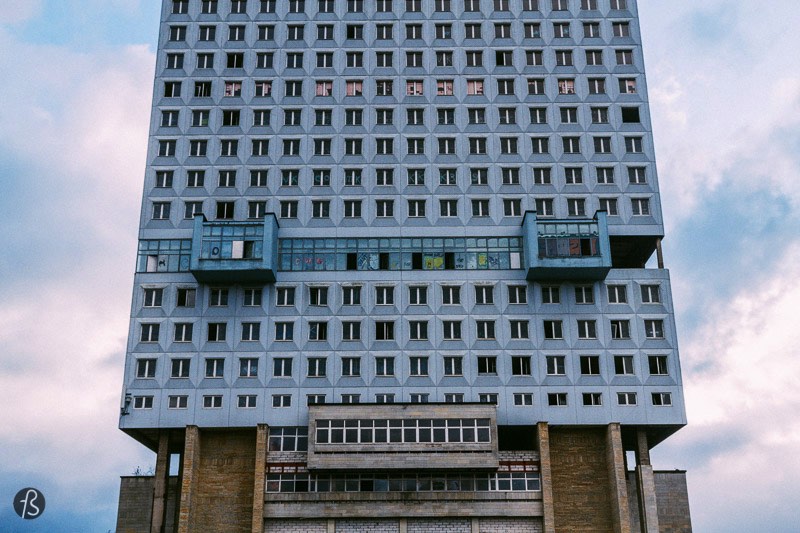No, of course not.
But the nature would be great regardless, so that still leaves an, at best, unremarkable city.
Nature is great in most countries, unless you are in (low) germany, where you can walk for a month with the same boring level terrain

No, of course not.
But the nature would be great regardless, so that still leaves an, at best, unremarkable city.

You might consider a few days here. Cinq Terre is in the area you are visiting.I thought about it but its a little off road for me this time. I am going to bundle it up with Genoa and such some time in the future.
Nature is great in most countries, unless you are in (low) germany, where you can walk for a month with the same boring level terrain
Athens has a certain style, even if you forget all the ancient sites. The ugliest cities in Europe are those that have neither style nor beauty. The post-WW2 cities that had been bombed to the ground and that were rebuilt without any particular style.
Why?I blame the Soviets with their Brutalism !


They have done a very good job of ensuring that tourists don't leave the eight or so square kilometers immediately around the akropolis, agora, Plaka, and presidential palace. As soon as you venture out of that area, the density of foreigners drops precipitously. By the time you get to, say, the Kerameikos, it's basically all Greeks on the streets. Perhaps it's intentional.Haven't been to Athens, but I have heard it's a concrete jungle. What's the deal with the planning boards there?
They have done a very good job of ensuring that tourists don't leave the eight or so square kilometers immediately around the akropolis, agora, Plaka, and presidential palace. As soon as you venture out of that area, the density of foreigners drops precipitously. By the time you get to, say, the Kerameikos, it's basically all Greeks on the streets. Perhaps it's intentional.
If most people associate Florence with the Renaissance, I don't see the problem. There are plenty of cities and towns here that include parks and interpretive centers and whole areas where the "pioneer era" is still very much on display, sometimes with costumed interpreters and re-enactors.
What's wrong with cities that are both?...The problem was the Thing I mentioned: I prefer cities that feel like cities and not like Disneyland sections or living history museums.
What's wrong with cities that are both?
Personally, if I were ever to go to Europe, it would be for the historical aspects (besides the local scenery; I'm really enjoying warpus' Norway thread). If I wanted to look at nothing more than a modern city, I'd stay home.
Why?
That's kind of the point.All non-tourist, but not just greeks by now. Parts like victoria are basically pakistan. Besides, why would tourists visit the periphery at all?
Really? The embassy annoyed you? It's along y'all's equivalent of Embassy Row. Not sure why that position is so bad. It's bigger than most other embassies, sure, because the US Department of State still gets money and can actually fund a proper mission, as compared with, say, the British Embassy, which a) looks architecturally godawful and b) is jammed into a side street several few blocks down.Another thing which surprised and disgusted me was just how blatand the mass and position of the american embassy is. The thing looks like a fortress; and it would have been the largest individual building in the avenue- if not for the opera (lol) which is next to it.
I felt ashamed, cause it spells out what a protectorate this is. But also annoyed at how reckless american diplomacy is.
I think that that's a slight exaggeration of what Athens is like (and a slight romanticization of what Rome is like). Athens does have more of a theme-park feel than Rome, but there's still plenty of life there, even in the classical city where all of the ancient stuff is jam-packed. And if you're concerned about romanticized ideals and kowtowing to tourists' expectations, the area of the akropolis and agora isn't all that different from the massive Colosseum + Imperial Palace + Forum + Circus Maximus zone in Rome.As I said: that's why I liked Rome and Siena.
I like travelling to experience cultures that aren't my own. A romanticized ideal of a bygone era cultivated in order to kowtow to tourists' expectations isn't culture to me: it's kitsch.
I think that that's a slight exaggeration of what Athens is like (and a slight romanticization of what Rome is like). Athens does have more of a theme-park feel than Rome, but there's still plenty of life there, even in the classical city where all of the ancient stuff is jam-packed. And if you're concerned about romanticized ideals and kowtowing to tourists' expectations, the area of the akropolis and agora isn't all that different from the massive Colosseum + Imperial Palace + Forum + Circus Maximus zone in Rome.
Is there something wrong with tourists going to a place where a lot of history took place and trying to imagine what it was like to live during that time?I don't disagree, and it's why I pointed to Siena and Rome as a better wedding of the two ends of the spectrum I described, that of: "kitschy façade so American tourists can feel like they're walking in the footsteps of their cultural ancestors" and "an actual city with life and grit that doesn't feel like it exists solely to satisfy that purpose." I think in the case of Rome, that is explained by the fact that it's a massive city where the central area is still in everyday use (à la London or Paris, though perhaps not to the same extent), and in the case of Siena because it's less well-known and doesn't capture the same Renaissance imaginations as Florence or Pisa or Venice.
At any rate, I've never been to Athens, so I don't really feel at liberty to discuss to what extent that city feels like a gaudy tourist trap, and indeed I was never contrasting Rome with Athens. I was drawing up Rome in contradistinction with Florence and Venice, cities whose sole business seems to be bottling the prestige of their bygone glory and selling it to American tourists so they can feel culturally refined or whatever.
And yes I recognize the irony in the fact that I literally just described the broad framework of the Renaissance.
